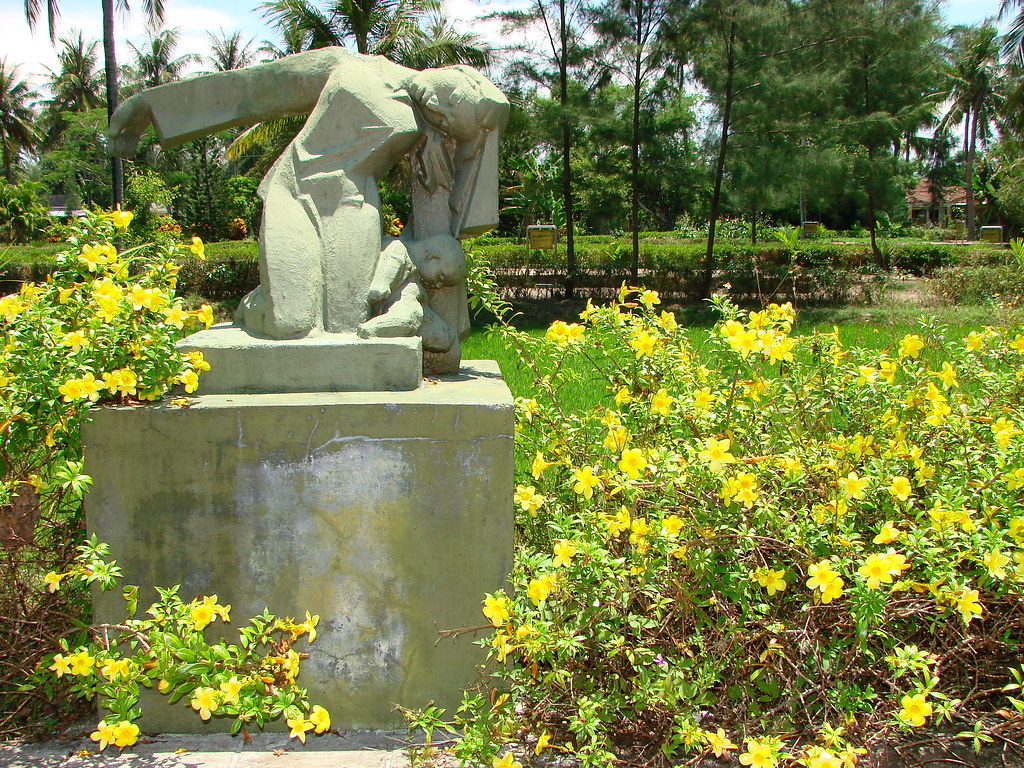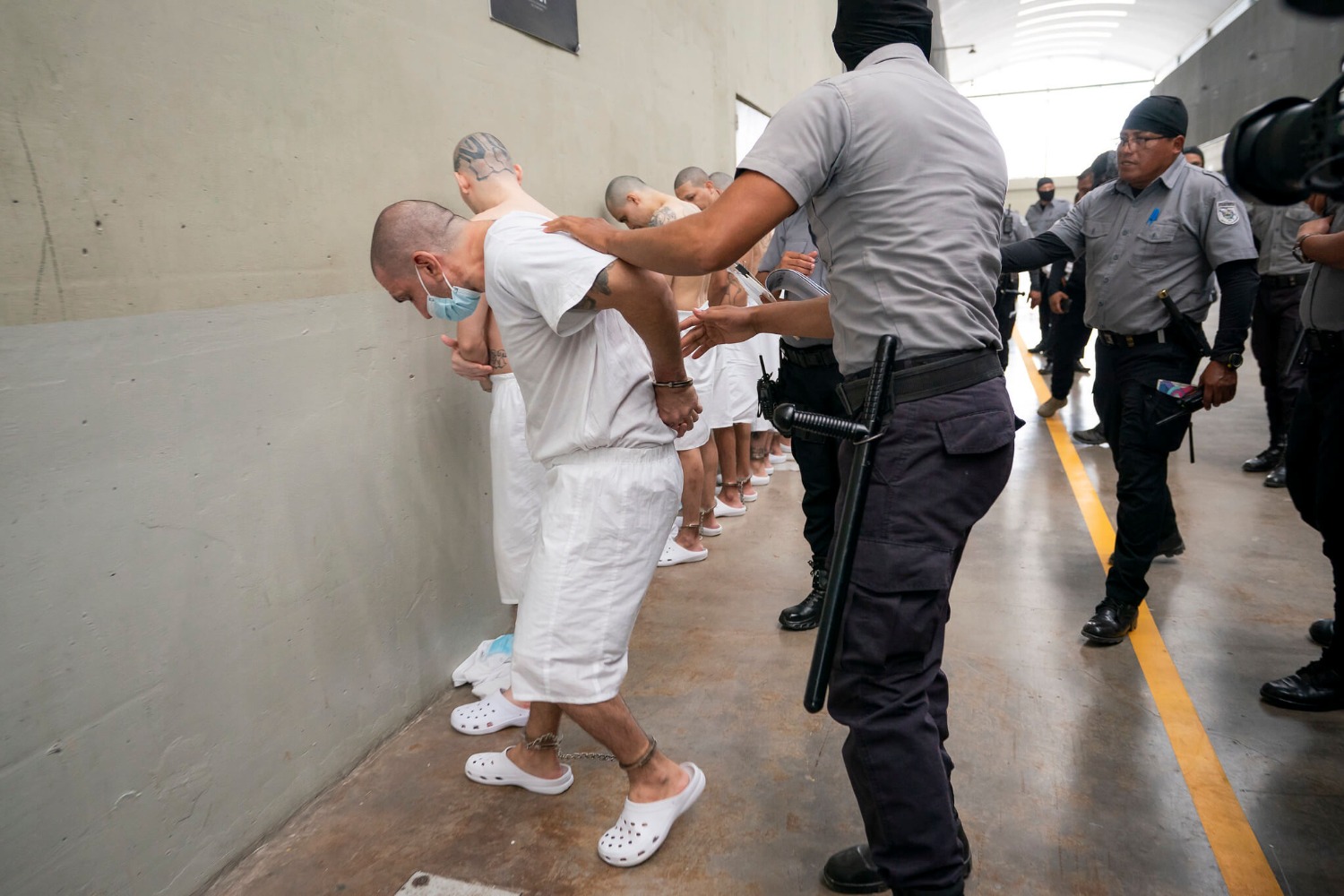When Presidents Intervene on Behalf of War Criminals
President Trump is reportedly considering ordering leniency for several U.S. service members accused or convicted of war crimes.

Published by The Lawfare Institute
in Cooperation With

President Trump is reportedly considering ordering leniency for several U.S. service members accused or convicted of war crimes. The New York Times reports that Trump has asked the Department of Justice to prepare pardon materials for Special Operations Chief Edward Gallagher, a Navy SEAL accused of shooting unarmed civilians and stabbing an enemy prisoner to death; Nicholas Slatten, a former Blackwater security contractor, who was found guilty of first-degree murder for his role in a shooting incident that left 14 Iraqi civilians dead and 18 injured; Maj. Mathew Golsteyn, who was accused of killing an unarmed Afghan man who had been linked to the Taliban in 2010; and a group of Marine Corps snipers charged in connection with urinating on the bodies of dead Taliban fighters. The pardons, the paper reports, are planned for Memorial Day, a holiday intended to honor those who have given their lives while serving in the U.S. armed forces.
Earlier this month, Trump pardoned former Army Lt. Michael Behenna, who was convicted of unpremeditated murder of an Iraqi prisoner.
We have been here before.
In 1971, a military jury rendered a verdict that a young service member named Lt. William Calley was guilty of war crimes in connection with the massacre at the Vietnamese hamlet of My Lai. Throughout Calley’s trial, there had been massive public outcry proclaiming his innocence. Even if this man had committed the acts for which he had been accused, his supporters said, they took place in the fog of war, and he’d spent months watching his friends be maimed or killed. Two days after he was sentenced to life in prison for murder, then-President Richard Nixon intervened to remove him from prison.
And two days after that, the 29-year-old judge advocate who prosecuted Calley took the extraordinary step of writing the president a letter. That letter is worth rereading in light of Trump’s apparently planned actions. It speaks to our moment and Trump’s contemplated pardons every bit as much as it spoke to Nixon’s clemency for Calley. “I would have hoped,” wrote Capt. Aubrey Daniel:
that all leaders of this nation, which is supposed to be the leader within the international community for the protection of the weak and the oppressed regardless of nationality, would have either accepted and supported the enforcement of the laws of this country as reflected by the verdict of the court or not made any statement concerning the verdict until they had had the same opportunity to evaluate the evidence that the members of the jury had.
Calley was the only person convicted of war crimes in connection with My Lai—the most notorious abuse committed by the United States during the Vietnam War. On March 16, 1968, roughly a hundred American soldiers stormed the village of My Lai, killing 504 unarmed civilians, including 17 pregnant women and 56 infants. Calley was ultimately convicted of murdering at least 22 Vietnamese civilians and sentenced to life in prison. Following Calley’s conviction on April 1, 1971, President Nixon ordered Calley removed from the stockade and placed under house arrest, where he would remain for three years before his release at the hands of a federal court order.
In response to revelations that Trump may pardon accused or convicted war criminals, commentators are rightly pointing to the specter of My Lai, Calley and Nixon.
Meanwhile, some former military officials have taken the unusual step of going on the record to express grave concern about the message the president’s decision might send to U.S. troops. Current senior officials have not yet spoken out publicly, although some have reportedly warned that if the U.S. is seen as not respecting laws of war, U.S. troops would be at a greater risk of being mistreated or killed should they be captured on the battlefield. Given the apolitical nature of military leadership and the extreme disincentives for disagreeing publicly with the commander-in-chief, it’s hardly surprising that there hasn’t been an outcry or formal protest from the U.S. military about the rumored pardons. It’s also why it’s so striking that an officer as junior as Aubrey Daniel publicly opposed Nixon’s decision to ease Calley’s punishment.
Parsing through Daniel’s remarkable letter may be helpful now that the country seems to have arrived at another inflection point for the president’s relationship to the prosecution of war crimes. Note that Trump’s contemplated action is far more dramatic than Nixon’s was. Nixon did not pardon Calley. He did not even commute his sentence. He merely changed his conditions of confinement after his conviction and pending appeal.
By contrast, Trump is reportedly contemplating actual pardons, including, in at least one case, a pardon granted before the trial process is even complete. So what Daniel said about Nixon’s action rings even truer about what Trump is supposedly planning. As Charles Lane of the Washington Post has pointed out, pardoning a service member for war crimes before trial would be unprecedented, and would have disturbing implications about the relative importance of a president’s whims and opinions in matters of military law and justice.
Daniel had three principal considerations: the effect the president’s decision would have on the military justice system, what the decision would mean for the jurors who had convicted Calley, and the implications of the massive public support for Calley. Consider first Daniel’s expressed concern for the effect of Nixon’s actions on the military justice system: “You have subjected a judicial system of this country to the criticism that it is subject to political influence, when it is a fundamental precept of our judicial system that the legal processes of this country must be kept free from any outside influences. What will be the impact of your decision upon the future trials, particularly those within the military?”
Retired Adm. William McRaven, a former Navy SEAL who has been famously precise about his criticisms of this president, carefully warned, “I think the president just needs to be cautious about signaling what he thinks the appropriate outcome of [war crimes] investigations should be.” On this point, even Rep. Dan Crenshaw of Texas, a supporter of the president and Navy SEAL veteran, said the Gallagher matter should be “decided by the courts, where the entirety of the evidence can be viewed,” and he noted “only after that should a pardon be considered.” Retired Chairman of the Joint Chiefs Gen. Martin Dempsey was more direct in his criticism of issuing pardons absent examining evidence:
Absent evidence of innocence or injustice the wholesale pardon of US servicemembers accused of war crimes signals our troops and allies that we don’t take the Law of Armed Conflict seriously. Bad message. Bad precedent. Abdication of moral responsibility. Risk to us. #Leadership
— GEN(R) Marty Dempsey (@Martin_Dempsey) May 21, 2019
And former Marine Corps Commandant Charles Krulak expressed a broader concern about the message the pardons themselves would send: “If President Trump follows through on reports that he will mark Memorial Day by pardoning individuals accused or convicted of war crimes, he will betray these ideals and undermine decades of precedent in American military justice that has contributed to making our country’s fighting forces the envy of the world.”
Daniel voiced a similar worry about those service members who played a role in Calley’s conviction. Of the six jurors who convicted Calley, Daniel wrote, “support has been given to those people who have so unjustly criticized the six loyal and honorable officers who have done this country a great service by fulfilling their duties as jurors so admirably. Have you considered those men in making your decisions?” Daniel noted that all six jurors “found themselves and their families the subject of vicious attacks upon their honor, integrity and loyalty to this nation.”
Nearly five decades later, the same can be said of the SEALs who reported on Gallagher and the military justice officials involved in the prosecution of Golsteyn. The SEALs who reported Gallagher’s alleged crimes were told by superiors that speaking out against him could cost them their careers. The investigators in the Gallagher and Golsteyn matters have been repeatedly criticized on Fox News and by some members of Congress.
In addition to the Calley jurors, another service member faced criticism from the American public after My Lai: Hugh Thompson. Thompson was a helicopter pilot who witnessed the killing from above. He landed his aircraft near a bunker full of cowering civilians and instructed his two crewmen—Larry Colburn and Glenn Andreotta—to turn their machine guns on U.S. troops advancing toward the bunker. He then oversaw the evacuation of 11 Vietnamese villagers and immediately reported what he had seen to a commanding officer.
Thompson, who died in 2006; Andreotta, who was killed in combat three weeks after My Lai; and Colburn, who died in 2016, are now known as the “heroes of My Lai.” They were awarded the Soldier’s Medal in March 1998. In the years following the massacre, however, as Thompson has described, he was viewed as a “traitor” and for years endured death threats and mutilated animals left on his doorstep. The chairman of the House Committee on Armed Services at the time, Rep. Mendel Rivers of South Carolina, publicly said Thompson was the only person who deserved punishment for actions taken at My Lai, as he had turned his weapons on U.S. troops.
In the decades since My Lai, the U.S. military has taken remarkable steps to prevent such atrocities from occurring. Military ethics, morality and laws of war are fixtures of training curricula across the military service and ranks. The massacre itself is prominent in such training—Thompson was invited to speak at nearly every service academy and his biography, “The Forgotten Hero of My Lai: The Hugh Thompson Story,” has been included in the Army Chief of Staff’s professional reading list.
Trump’s proposed pardons might empower the next William Calley or Capt. Ernest Medina—Calley’s commanding officer, who allegedly told his troops that the assault on My Lai was their chance to avenge fallen comrades. But his actions are also concerning in how they might stymie and quash the next Hugh Thompson. Should he choose to pardon alleged war criminals—especially before their actions can be judged in a court of law—President Trump will send a message not only that war crimes are forgivable but also that those who risked their careers and livelihoods to report and justly prosecute atrocities were wrong to do so.
The military’s legal and education system is set up to reward those with integrity and punish those who violate the military’s stated laws and values. But culture changes slowly. The My Lai cover-up and the pillorying of Hugh Thompson are not as far in the past as many would like to believe. The struggles of the SEALs under Gallagher’s command to initiate an investigation into his alleged crimes and the ensuing public campaign are testament to a still-maturing culture of reporting rare-but-significant battlefield atrocities.
While Daniel was concerned primarily with the president’s choice and the impact it would have on the military justice system and the Calley jurors, he also had some insights to share about the American public:
I would prefer to believe that most of the public criticism has come from people who are not aware of the evidence as it was presented, or having followed it they have chosen not to believe it. To believe ... that any large percentage of the population could believe the evidence which was presented and approve of the conduct of Lieutenant Calley would be as shocking to my conscience as the conduct itself, since I believe that we are still a civilized nation. If such be the case, then the war in Viet-Nam has brutalized us more than I care to believe.
In 1971, 79 percent of polled Americans opposed Calley’s conviction. Massive public protests were held in his honor, and petitions and a Top-40 folk song were dedicated to his innocence. The public campaigns on behalf of Gallagher, Golsteyn and the others are much smaller. In fact, the Daily Beast has reported that Trump’s idea to issue the pardons likely stems from the concerted effort of Pete Hegseth of Fox & Friends. Nonetheless, the notion of the commander-in-chief excusing the conduct for which these men have been accused is a disturbing continuance of his advocacy of atrocities as a candidate. Back then, Trump argued for targeting the families of Islamic State members and the use of torture techniques “stronger” than waterboarding, and as president he has touted the slaughter of prisoners of war.
So far, Trump’s bark on this score has been worse than his bite. These pardons would change that. They would mark the first time that he has affirmatively used his presidential powers to state where the United States under his administration stands on the laws of war. And the international legal community is taking notice. On May 24, the International Committee of the Red Cross (ICRC) issued a rare public statement expressing concern: “In the case of armed conflicts, other relevant factors include the potential impact of pardons on military discipline or a country’s reputation and security if violations of international humanitarian law (IHL) are not dealt with—or perceived to have not been dealt with—sufficient seriousness. Pardons might also dissuade others from reporting violations, which can contribute to an atmosphere that allows violations to continue.”
While none of the conduct in question today is on the scale of My Lai, individuals protected by the laws of war were allegedly murdered by U.S. citizens and service members, or their bodies were desecrated after dying in battle. Here, too, Daniel’s letter offers a final warning on the nature of the atrocities at issue:
While in some respects what took place at My Lai has to be considered a tragic day in the history of our nation, how much more tragic would it have been for this country to have taken no action against those who were responsible.
That action was taken, but the greatest tragedy of all will be if political expediency dictates the compromise of such a fundamental moral principle as the inherent unlawfulness of the murder of innocent persons, making the action and the courage of six honorable [jurors] who served their country so well meaningless.
The United States may find itself asking the same question that Daniel asked of Nixon: What will happen if political expediency is elevated over fundamental moral principle and the rule of law? Daniel did give Nixon credit for one thing: Prior to the Calley decision, he wrote, the president had been unequivocal in his statements that the atrocities at My Lai were “abhorrent” and that the United States should never “condone or use atrocities against civilians.” In his candidacy, President Trump expressed nearly the opposite sentiment. Asking the young captain’s question in the face of a president wielding the almost unassailable pardon power, combined with his authority as commander-in-chief and an utter disparagement of law and moral restraint in war, may yield a deeply troubling answer.




